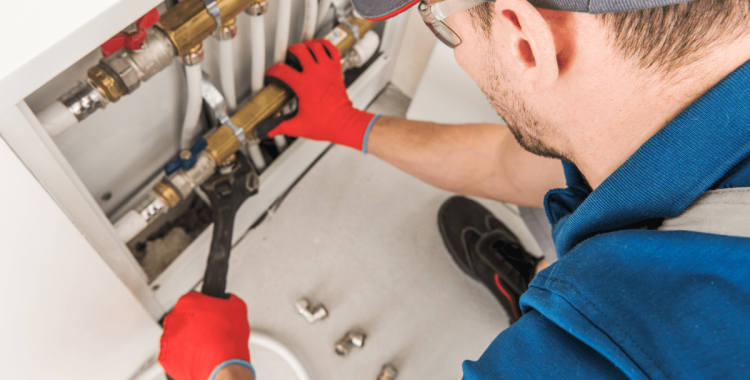The Importance of Commercial Plumbing Maintenance Plans
In the fast-paced world of business operations, few things can bring a company to a standstill as quickly as plumbing issues. Whether it’s a blocked drain in a restaurant kitchen, a leaking pipe in an office building, or low water pressure in a retail store, plumbing problems can lead to operational delays, safety hazards, and expensive repairs. That’s why commercial plumbing maintenance plans are essential for any business that relies on functional, high-performing plumbing systems.

What Is a Commercial Plumbing Maintenance Plan?
A commercial plumbing maintenance plan is a proactive service agreement between a business and a plumbing contractor. It typically includes regularly scheduled inspections, cleaning, repairs, and system testing to ensure all plumbing systems are running efficiently. From water heaters and grease traps to drain lines and fixtures, these plans cover the full spectrum of commercial plumbing needs.
Rather than waiting for problems to arise, maintenance plans help identify potential issues early, reducing the risk of unexpected breakdowns and costly emergency repairs.
Why Regular Plumbing Maintenance Matters
For commercial properties, plumbing systems are under much greater strain than those in residential settings. High usage, complex infrastructure, and building code regulations all add to the demands placed on plumbing systems. Without routine maintenance, even minor issues can quickly escalate into significant problems. Here’s why consistent maintenance matters:
Avoid Downtime: Plumbing emergencies can shut down operations, especially in sectors like food service, healthcare, and hospitality. Maintenance plans help prevent such interruptions.
Protect Infrastructure: Water damage from leaks or burst pipes can compromise the structural integrity of a building and result in expensive renovations.
Compliance with Regulations: Commercial properties must meet local plumbing codes and health regulations. Regular inspections help ensure compliance, avoiding fines and legal issues.
Lower Operating Costs: Preventative maintenance extends the life of plumbing fixtures and equipment, reducing the need for replacements and emergency repairs.
Environmental Responsibility: Maintaining plumbing systems can help reduce water waste through timely leak detection and efficient fixture upgrades.
What’s Included in a Plumbing Maintenance Plan?
While the specifics may vary depending on the provider and the type of commercial facility, most plumbing maintenance plans include:
Scheduled Inspections: Technicians perform routine checkups to assess pipes, fixtures, water heaters, and other components.
Drain and Sewer Cleaning: Preventative cleaning helps avoid clogs and backups, especially in high-use environments.
Leak Detection and Repair: Early identification of leaks reduces water waste and prevents structural damage.
Water Heater Servicing: Includes flushing tanks, checking thermostats, and inspecting safety valves.
Backflow Testing: Ensures that contaminated water doesn’t flow back into clean water lines, which is critical in healthcare and food-service settings.
Fixture and Valve Checks: Toilets, faucets, and other fixtures are examined for wear, corrosion, and function.
Grease Trap Maintenance: Essential for restaurants and food facilities to avoid sewer backups and foul odors.
Choosing the Right Plumbing Partner
Selecting the right commercial plumbing service provider is as important as the maintenance plan itself. Look for a licensed, insured contractor with experience in commercial plumbing systems. A good provider will offer customizable plans, clear communication, 24/7 emergency support, and a strong track record of client satisfaction.
Additionally, ask about the technologies they use. Some companies employ video pipe inspection, smart sensors for leak detection, and software for real-time reporting and scheduling—all of which can enhance the efficiency and reliability of your maintenance plan.
Long-Term Savings and Peace of Mind
Although some businesses hesitate to invest in ongoing maintenance, the long-term savings far outweigh the initial costs. Just like routine oil changes prevent engine failure in vehicles, regular plumbing maintenance helps your systems run smoothly and avoid breakdowns.
Imagine discovering a small crack in a pipe during a scheduled inspection, rather than after a ceiling collapse from hidden water damage. Or having a technician spot early corrosion in a boiler system, allowing you to address it before it fails during peak season. These preventative actions not only save money but also offer peace of mind.
Tailored Plans for Different Industries
Every commercial property has unique plumbing needs. Here’s how maintenance plans vary across industries:
Restaurants and Cafes: Focus on grease trap maintenance, drain cleaning, and kitchen equipment.
Offices: Emphasize bathroom fixture upkeep, leak detection, and water heater efficiency.
Healthcare Facilities: Require stringent backflow prevention and sanitation standards.
Retail Spaces: Need regular inspections of restroom facilities and employee kitchenettes.
Industrial Facilities: May include high-capacity systems, specialized waste disposal, and safety compliance inspections.
By tailoring the plumbing maintenance plan to your industry and building type, you ensure that no component is overlooked.

In today’s competitive business environment, no company can afford the downtime, damage, or health hazards caused by neglected plumbing systems. Commercial plumbing maintenance plans offer a smart, strategic way to stay ahead of problems, reduce costs, and protect both property and reputation.
If you own or manage a commercial facility, consider investing in a comprehensive plumbing maintenance plan. It’s a small step that can lead to big savings—and even bigger peace of mind.